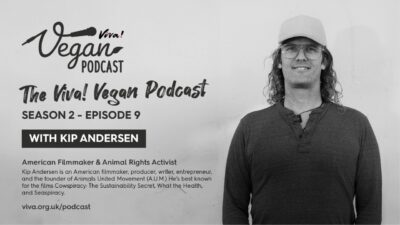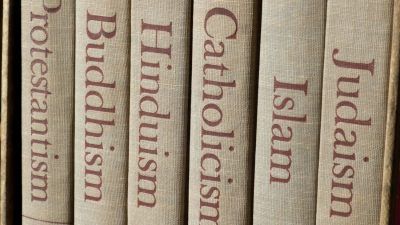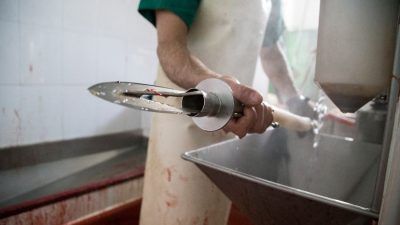Christspiracy Review
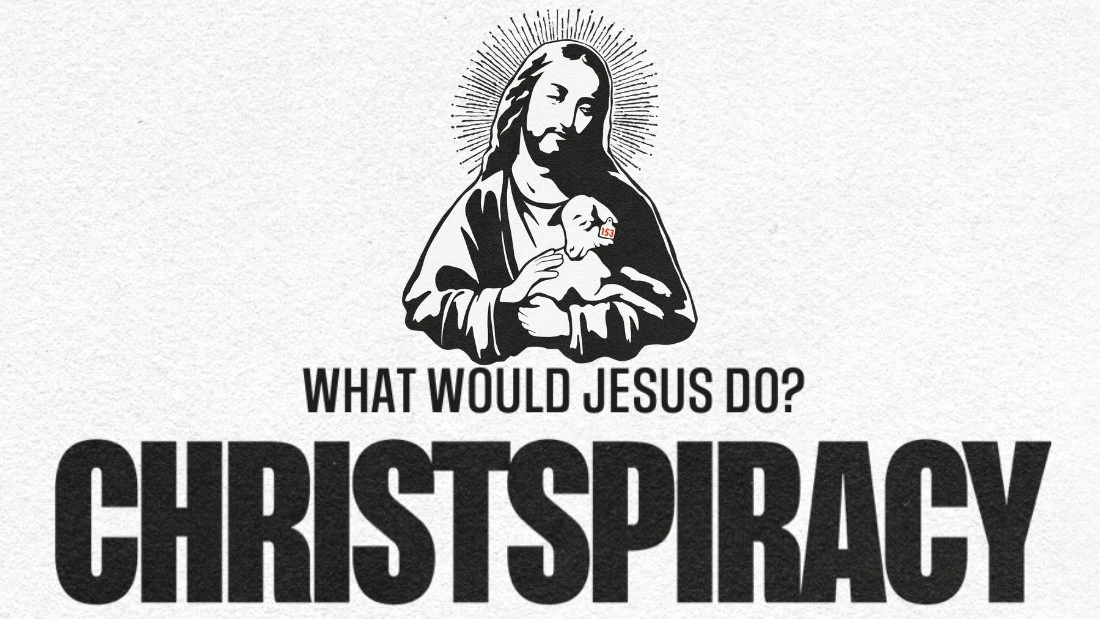
Kip Andersen’s latest ’spiracy’ documentary delves into thought-provoking questions posed by Kameron Waters at the film’s outset: “Is there a spiritual way to kill an animal?” and “How would Jesus kill an animal?“. These enquiries serve as the springboard for a narrative arc that that delves into different cultures, time periods and belief systems. The film intertwines and overlaps themes related to the emotional, historical and moral complexities of trying to ethically justify animal slaughter, while – and let’s just say it – illustrating just how far organised religion will go in finding loopholes to their teachings, to justify killing and consuming meat.
Kip Andersen is a revered figure among vegans, with his groundbreaking films Cowspiracy and Seaspiracy serving as scathing indictments of the commercial meat and fishing industries, respectively. In What the Health he shifts the focus to diet exposing cover-ups by global health organisations. With each project, Andersen fearlessly challenges societal norms and establishments, solidifying his reputation as a bold advocate for environmental and ethical causes – sometimes, as you will see in Christspiracy, at a risk to his own personal safety. (Spoiler alert), there is a scene where Kip is followed and his apartment is broken into and trashed – and yes, I thought it too, how very Da Vinci Code!
Kip’s films are illuminated by their intense explorations of hidden truths and in that respect Christspiracy feels like the culmination of years of work. At the London premier, Kip joked about how it took God six days to create Earth, but six years to make this film, a coruscating documentary analysis tying up what we already know about the meat industry within the context of perhaps the biggest conversational taboo: religion.
So, what’s shocking about it?
Well, firstly, Kip and Kameron aren’t setting out to dismantle any specific religion all the big hitters are included, Hinduism, Buddhism, Judaism, Islam and Christianity. For Kameron especially, the film unfolds as a personal journey. It’s only when they start questioning widely accepted beliefs and digging deeper that they uncover the corruption surrounding animal slaughter within different religions.
As you might anticipate, the documentary contains some shocking moments, such as the Hindu festival at Gadhimari. Every five years, the world witnesses the largest animal sacrifice at the Gadhimai Temple in Nepal’s Bara district, around 200 kilometres south of Kathmandu. Following a month-long celebration, or ‘mela’, the festival culminates in the ritual slaughter of tens of thousands of animals. A horrifying sight to Westerners, but as one participant points out; much less than the millions of turkeys slaughtered in the US for Thanksgiving.
This mass slaughter was particularly surprising to me. Hindus believe that animals may contain the souls of ancestors to be reborn as friends and family members. It’s even said that Brahma imbued animals with specific secrets, symbolising their spiritual significance to humans and that Shiva bestowed upon them states of yogic awareness. So, to learn that during the festival’s peak in 2009, around 500,000 buffalo, goats, pigeons and other animals were slaughtered– well, that’s a hefty karmic debt right there!
This sentiment resonates across the cattle killings in India too. Despite Dharmic religions like Jainism, Hinduism and Buddhism revering cows as sacred, India has swiftly risen to become one of the world’s largest beef exporters. The documentary delves into how this industry has been co-opted by what one interviewee describes as a ‘mafia organisation’.

Meanwhile, shifting focus to the Christ element of Christspiracy, we are told about Biblical Daniel, a devout vegetarian whose influence extends to modern-day churchgoers following what’s known as the ‘Daniel Plan’. This plan, theoretically advocating a vegetarian diet, urges followers to abstain from ‘royal foods’ like meats and wine, as described in the Book of Daniel, instead advocating for a diet rich in vegetables and water. However, the documentary swiftly exposes a contradiction: even The Daniel Plan cookbook promotes meals such as Cast Iron Pork and Chile Lime Chicken. I won’t spoil the uncomfortable yet intriguing viewing experience of watching priests attempt to justify why meat is included in the plan.
The pivotal revelation (see what I did there?) comes when examining the final events in Jesus’ life– his protest in the temple and subsequent crucifixion as a direct consequence. It’s unveiled that Jesus protested against animal sacrifice, revealing the ancient temple in Jerusalem to be more of a slaughterhouse than a modern synagogue or church. Naturally, it’s essential to mention Paul’s role in shaping the church’s modern evolution and his canonisation of the New Testament. While he’s mostly relegated to a footnote in this narrative, we catch a glimpse of some of the more controversial and perceived anti-vegetarian claims made in the documentary, particularly in relation to his association with James, Jesus’ brother and his teachings.
Many non-vegans use Paul’s scripture to justify killing animals, but they overlook the numerous historical figures like Jerome, Basil the Great and others who were vegetarians. Even Eusebius mentions that the apostles abstained from meat and wine. Paul’s famous mention of “the weak man eats only vegetables” (Romans 14:2) has been used to criticise vegetarians as lacking faith, a view endorsed by St Augustine, and this is what the documentary touches on.
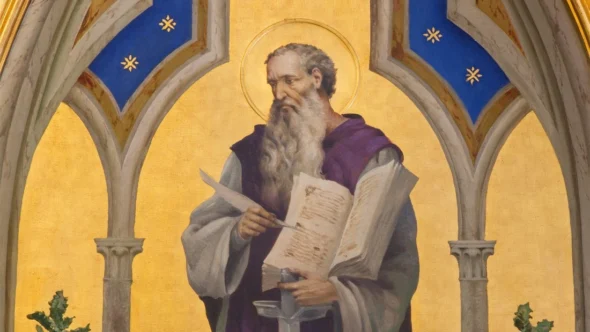
Saint Paul the Apostle
One thing that isn’t mentioned is that while Paul says it’s fine to eat whatever meat is sold in the market without worrying about its origin (1 Corinthians 10:25), he does urge respect for those who don’t eat meat, emphasising not causing offense (1 Corinthians 8:13; Romans 14:21). For me, I did feel this part was conveniently overlooked a little in the documentary, to add to the wow moment when it was revealed Jesus and James were vegetarians. (They also don’t mention the fact it’s likely Peter and John were also vegetarian, as suggested by disputes over vegetarianism and animal sacrifice in letters like Romans 14 and 1 Corinthians 8–10). Either way, Paul is clearly aware of the ethical debate around eating meat, and vegetarianism. After all, if Jesus ate meat, surely, Paul could have used that to justify it? But he chose not to.
Kip Anderson’s documentary is a masterstroke for the director, which seeks to weigh up our value systems: after all, how can you claim to live a life based on compassion, as per all religious teachings, and yet support animal suffering and cruelty? how can we apportion greed and misery and responsibility and compassion? and who judges that?
For vegans with religious beliefs, the answers to these questions may be easier to reconcile. But to those who consume meat, the documentary succeeds in shedding light on the uncomfortable truths surrounding animal slaughter within different religious practices. Through shocking revelations, Christspiracy will make viewers reflect on their own values and choices, challenging them to consider the consequences of their dietary habits on animals, the environment and their spiritual integrity, whether they like it, or most likely won’t.
By daring to confront the convergence of religion and animal rights, Andersen’s film serves as a powerful catalyst for dialogue and introspection, urging us as humans to reconsider our place in the world and our responsibility towards compassion for all living beings.
Great work Kip!




